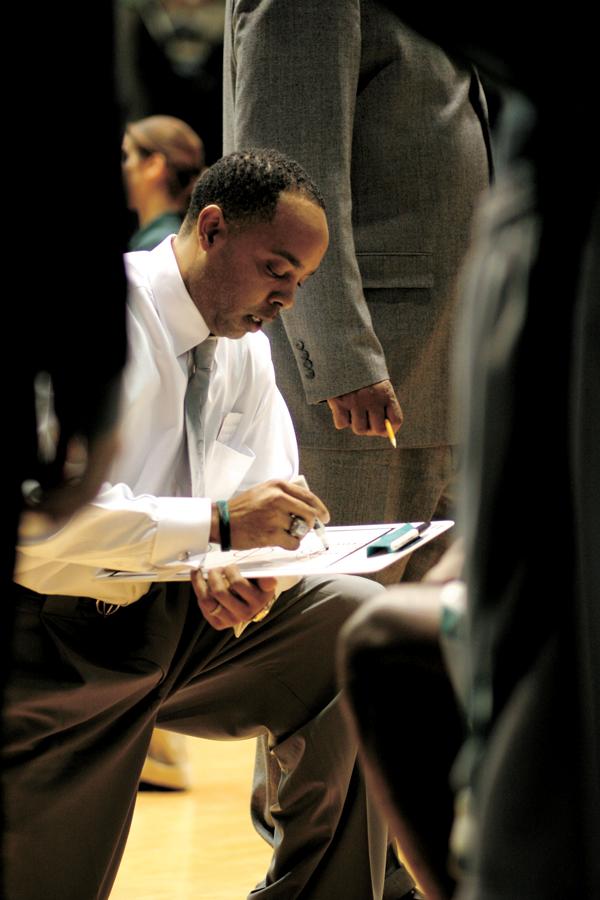
Kevin Broadus, the former head coach of men’s basketball at Binghamton University, is writing a book after resigning from his position last November.
Broadus, who received a $1.2 million settlement in return for his departure and a commitment to drop a discrimination lawsuit, has not yet announced what the book will be about.
Broadus could not be reached for this article, and neither his literary agent, Frank Weimann of Literary Group International, LLC, nor his attorney, Linda Kenney Baden, responded to calls and e-mails seeking comment.
The former coach all but confirmed that he is writing a book by posting a link on his website, www.kevinbroadus.com, to press coverage of the forthcoming work. Baden did the same on her Twitter account.
Broadus previously stated in a letter to the editor published in The Wall Street Journal in April 2010 that he would eventually give his version of what transpired during his tenure at BU.
“At the appropriate time I will speak more directly to many of the inaccurate and misleading allegations that have been misreported regarding our program and me,” Broadus wrote, possibly alluding to the book he is authoring. In the meantime, he has generally refrained from speaking with the press.
After coming to BU from Georgetown University in 2007, Broadus helped lead the men’s basketball team to its first America East conference title in the 2008-09 season.
The school’s basketball program was engulfed in scandals the following year after six players were dismissed from the team for criminal misconduct ranging from theft and debit card fraud to the sale of crack cocaine, and allegations were made by a faculty member that she had been pressured to give basketball players special treatment in regard to grades.
Additionally, Broadus admitted to having violated NCAA rules by attempting to recruit two high school players during a specified “no contact” period, though he initially denied the contact.
An external audit ordered by SUNY Chancellor Nancy Zimpher and conducted by former Chief Judge of New York Judith Kaye found that members of the University administration from coach Broadus to then-President Lois DeFleur had been complicit in lowering admissions and academic standards in favor of athletes. The audit also reported text message exchanges between Broadus and an assistant seemingly discussing how to cover up players’ off-the-court misdeeds.
In the wake of these scandals, Athletic Director Joel Thirer resigned — though he contends he was fired — Broadus was placed on indefinite paid leave, and the school withdrew the men’s basketball team from the 2010 America East tournament.
Broadus, who is African-American, filed complaints with the New York State Division of Human Rights and the U.S. Equal Employment Opportunity Commission in the spring of 2010 alleging that his removal from coaching duties and the athletic department investigation were motivated by racial discrimination. In April 2010 he was reassigned to the newly created office position of senior athletic administrator for academic assessment and achievement.
In October 2010, the NCAA closed its investigation of the Binghamton basketball program, stating in a letter to Interim Athletic Director Jim Norris that it found no major infractions.
When BU Interim President C. Peter Magrath insisted in a press conference on the NCAA’s findings that Broadus would not be reinstated as coach, Baden told media organizations that Broadus would file a federal discrimination lawsuit the following week.
The University moved quickly to settle with Broadus, announcing the same day Baden had said the lawsuit would be filed that Broadus had agreed to step down and withdraw all legal claims in return for $1.2 million, of which $819,115, or the remainder of Broadus’ employment contract through 2014, would be paid by BU’s athletic department, and the additional $380,884 would be paid by SUNY.
At the time of the settlement, Baden told Pipe Dream that Broadus wanted to de-emphasize any claims he had made regarding the basketball program and his position.
“He wants to focus on moving forward,” Baden said last October.
The terms of Broadus’ settlement bar him from taking future legal action against the University, but do not preclude him from publishing a book that offers his account of events.


